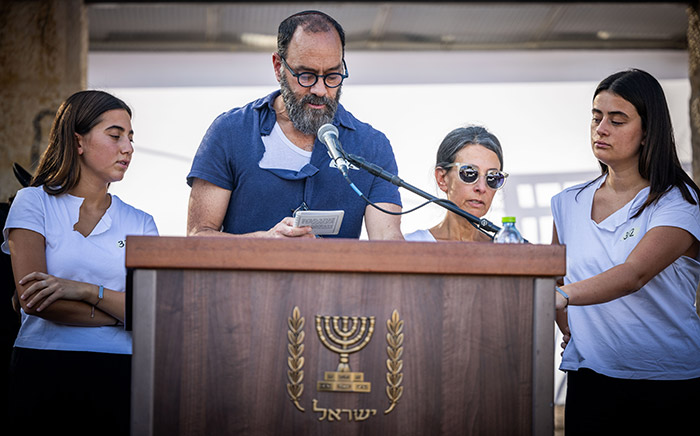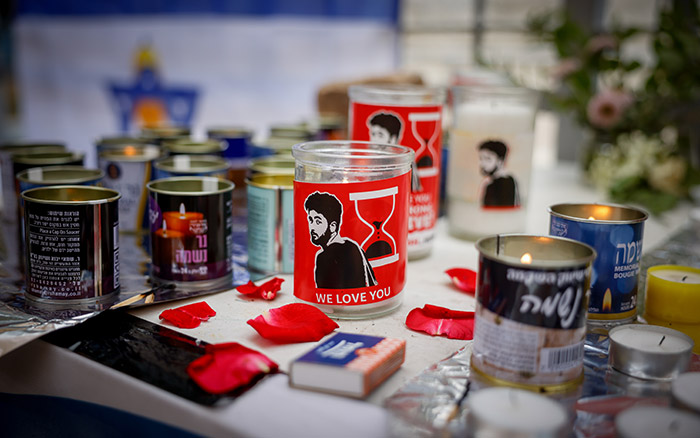Being Jewish
Commentary
Hearing the Shofar Blast at the Shiva for Hersh Goldberg-Polin

I don’t usually spend a lot of time thinking about Elul, the Jewish month that marks the prelude to the High Holidays.
I’m familiar with the rituals of the month: The blowing of the shofar every day at the end of morning services until the day before Rosh Hashanah, the recitation of certain Psalms and selichot (penitential prayers) throughout the month.
It’s not that I don’t believe in the fresh start offered by Elul. I do. I view September—which most often coincides with Elul—as not only the start of the school year and the month of my birthday but as the “real” new year, more so than January, which feels like the middle of the 12-month Gregorian calendar rather than the start of it.
I suppose that a busy life and the fact that I’m not much of a daily worshiper, and haven’t been in years, have gotten in the way of marking Elul.
And yet this year, this Elul, I heard the shofar sound on the first day of the new month.
I heard its clarion call, that clear burst of sound, when it was blown at the end of morning services during a shiva minyan for Hersh Goldberg-Polin, the American Israeli hostage who survived 11 months of Hamas captivity only to be executed along with five others in a dark, dank tunnel deep beneath Rafah, in Gaza.
It was Tuesday morning, the day after Hersh’s funeral. My family had been among the thousands who attended his Monday burial, which had begun with us accompanying Hersh’s remains with his parents, Jon Polin and Rachel Goldberg-Polin, his sisters, Leebie and Orly, and the rest of their family to Har Hamenuchot cemetery in the Judean Hills near Jerusalem.
The shiva for Hersh began on Monday night—a private gathering for the family. However, Tuesday morning started with morning prayers with the mourners, held in a tent set up by the Jerusalem municipality in a parking lot next to the family’s apartment building.
Jon led us through the words and tunes that comprise the familiar, meditative morning prayers.
At the very end, the shofar was blown, marking the beginning of this significant month, a month that is usually seen as a fresh start, a new year. For this crowd, it represented the end of a young life, a life full of hopes and dreams, and it represented one family’s anguish for their 23-year-old son and brother.
On the last day of shiva, I sat across the aisle from Moshe Shapira, the father of Aner Shapira, Hersh’s best friend who was killed on October 7. Aner, Hersh and 27 other Nova music festival-goers had taken refuge in a field shelter that black morning as Hamas attacked the desert rave, killing and assaulting hundreds.
Aner, an off-duty soldier, stationed himself at the front of the shelter and bravely took charge, tossing back grenades thrown by the terrorists. The eighth one killed him.
It was Aner’s father who blew the shofar during that final shiva morning, lifting it with one hand to his mouth, blowing it clear and true, signaling to us once again his intentions for this coming year.
Shapira had appeared the previous night at the weekly Jerusalem hostage protest, this one attended by thousands. An architect who rides an electric bicycle around the city and wears a big black kippah over his graying curls, Shapira had spoken about the need for unity—among Israelis, among Jews of all kind and from every stream.
As I stood there and listened to the shofar’s call, I thought about unity and wondered if fighting for such an ideal, something I strongly believe in, could be one of my resolutions for this coming year.
A friend sitting next to me pointed out a word she noticed anew in her siddur, “chemla”—Hebrew for compassion.
“It’s a word that means something that it didn’t before,” she said.
I could understand that. Compassion for the mourners, compassion for the suffering Gazans, compassion for the hostages and their families, for the evacuees, for the injured, for the reservists—for anyone affected by this painful, ongoing mess.

Unity and compassion were among the messages I was thinking about as I listened to stories people were sharing about Hersh, about his hopes for justice and bridging differences. And about his ability to take a string bag for a six-week trip through Europe and his belief in vegetarianism despite not liking vegetables.
I was also faced with the belief my friends Jon and Rachel hold, a straightforward, unapologetic belief in God, prayer and the rituals of Jewish life. This framework has given them structure and hope in these last months and throughout their lives.
I’m thinking about all of this as I prepare to lead the morning prayers on one of the days of Rosh Hashanah at my Jerusalem synagogue. On that morning, I’ll sing a Psalm that’s been added to the services of many congregations in the last 11 months and recited by Jon during the shiva minyan—from “A Song of Ascents,” a cornerstone of High Holidays’ prayers.
“Out of the depths have I called you, God
Lord, hear my voice, let your ears hear the voice of my supplications
I wait for God, my soul waits, and in his word I do hope
My soul waits for God, more than watchmen for the morning
Israel, have hope in God, for with God there is mercy, and with him there is redemption.”
One can pray for help, for salvation, for saving hostages from captivity by a terrorist group in Gaza. But one also has to pray for strength to sustain oneself in these times, to hold oneself up while supporting others.
I’ll keep listening for the shofar during the month of Elul, as we head into the High Holidays, which begins with Rosh Hashanah on the evening of October 2. The 10 days between Rosh Hashanah and Yom Kippur include October 7, when we will mark one year since the Hamas terrorist attacks, when more than 1,200 were killed and hundreds were injured, assaulted, taken hostage and evacuated from their homes. When this country was thrown into a chaos of such mammoth proportions that the disruption and turmoil haven’t ceased a year later.
I will let the shofar guide me and give me hope to protest and to pray.
Jessica Steinberg is the longtime arts and culture editor for The Times of Israel. She pivoted to coverage of the hostages taken captive to Gaza by Hamas on October 7, speaking to their families, to those who have been released and covering their stories in articles and The Times of Israel’s Daily Briefing podcasts.








 Facebook
Facebook Instagram
Instagram Twitter
Twitter
Barbara Klestzick says
Lovely article. Thanks so much. It helps in dealing with the death of the hostages. It’s still really hard but somehow it helps.
Ayellet says
I disagree with these parents. They had an opportunity when they were speaking to the DNC filled with pro terrorists anti-Israel leftist woke Jew haters. She had the perfect opportunity to tell them what Hamas did that they raped, beheaded, murdered, slaughtered, burnt alive, innocent Jews, but no, she tried to be even handed did not call out Hamas. And actually gave sympathy to the poor suffering on. BOTH SIDES?? Hundreds of Israeli soldiers were slaughtered lost limbs never be seen again killed their parents aren’t calling for disaster ceasefire. Look what happened when one Israeli hostage was traded for 1000 terrorists well one day later eight Israelis were killed so you can’t make deals with terrorists, but she had an opportunity to say that at the DNC she had the stage but no, she seemed to make it all about peace, love, and understanding and not to call out the evils of the terrorists What a shame what a wasted opportunity
Summer Nale says
You didn’t lose anyone on that Saturday, or since. While you’re allowed your opinion, I cherish and respect Jon and Rachel. She was the beacon of hope and strength for every israeli and jew around the world. Her elegant poise and class far outweighs her oversight at the DNC. Omer Neutra’s parents took the RNC, Polins took the DNC. That was the only time Rachel lost composure, mYbe you could use some chemla